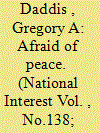| Srl | Item |
| 1 |
ID:
138999


|
|
|
|
|
| Summary/Abstract |
EARLIER THIS year, West Point’s Defense and Strategic Studies Program invited me to participate in a panel discussion on the future of warfare. For historians, and particularly for Vietnam War students like me, such requests seem fraught with peril. Given the contentious debate that continues to surround America’s involvement in Vietnam, now fifty years after Lyndon Johnson’s fateful decision to send ground combat troops to Southeast Asia, commenting on the future of warfare obliges conjecture without much evidence. Yet for uniformed officers considering strategic issues and the use of military force, these questions surely are as sensible as they are unavoidable.
|
|
|
|
|
|
|
|
|
|
|
|
|
|
|
|
| 2 |
ID:
162068


|
|
|
| 3 |
ID:
119909


|
|
|
|
|
| Publication |
2012.
|
| Summary/Abstract |
Famed seventeenth-century jurist Hugo Grotius warned that in warfare belligerents must "not believe that either nothing is allowable, or that everything is." The latter belief holds that any and all tactics are allowed in warfare, while the former, a largely Christian theological view, holds that warfare is immoral and any resultant actions are therefore prohibited. Grotius understood that unilateral adherence to either of these notions would lead directly to an unworkable paradigm. Rejecting each belief's most extreme position while simultaneously adopting their reconcilable characteristics, Grotius began to develop a feasible legal framework for conducting warfare. Ultimately, as Oxford University's Karma Nabulsi describes in her outstanding work Traditions of Justice and War, by seeking the "middle ground" between these two seemingly incompatible views Grotius successfully shaped a conciliatory, realistic model for regulating warfare. The resultant middle ground, which recognized the necessity and legality of "just" wars while proscribing certain aspects of military conduct, solidified Grotius's legacy and, more importantly, set the stage for the profound legal developments-particularly in the 20th century-that would circumscribe subsequent conflicts, including those in which the United States finds itself today.
|
|
|
|
|
|
|
|
|
|
|
|
|
|
|
|